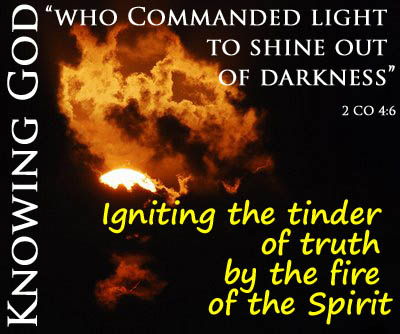
Knowing God—A Study in 2nd Corinthians
Moving Beyond Knowledge into Experience—
Igniting the Tinder of Truth by the Fire of the Spirit
Gene Cunningham - November 28, 2003
Joshua # 10 -- Jos 6:1-19

We have great hope for the future, but also responsibility (2Ti 2:11-13, 2Ti 2:20-21). We must chose to be a vessel of honor or dishonor. The battle of Jericho in chapter 5 shows the keys to victory. Faith implies surrender. Faith is confident expectation in God's relationship (Heb 11:1). He is always true to His Word. Faith comes by hearing (Rom 10:17). There's separation, then fellowship then obedient surrender. Chapter 6 uses the number 7 many times, symbolizing perfection/completion, but also Christ (1Co 15:57). He wins the victory; we enjoy the rest. The trumpets used were ram's horns "shofar" (Jos 6:4) — God's message is simple. Hebrew word for trumpet means jubilee. When God gives an opportunity to rest and we don't take it, all that's left is judgment.
God speaks of Jericho gift to the people as a past event (Jos 6:16). What have we not claimed God has already given? The residents of Jericho didn't come out to seek peace (Jos 6:1). They chose not to believe (Heb 11:30). God warns them not to take of the cursed things - vessels of dishonor (Jos 6:18-19). Some things have to be destroyed, others delivered. Hebrew "Cherem" - exclusion from common use or abuse, but devoted for particular use. Rahab is an example of separation for use; she was placed into the line of Christ.
If God dealt so severely with His people in the past, "how shall we escape" if we take for granted our salvation (Heb 2:3). "Qadash" in Hebrew means to make Holy (Jos 6:19). We get to chose blessing or cursing (Deu 11:26-28). Once something is devoted to God it cannot be retrieved (Lev 27:28-29). Man has the capacity for godliness and godlikeness, but apart from God, can also be the height of evil. We have awesome potential if we are faithful (2Ti 2:11-21). Hymenaeus was a sanctified believer entrusted as a teacher, but turned over to Satan (1Ti 1:20).
Scripture References: Leviticus 27:28-29, Joshua 6:16, Deuteronomy 11:26-28, Joshua 6:4, Joshua 6:19, Romans 10:17, Hebrews 2:3, Hebrews 11:1, Joshua 6:18-19, Hebrews 11:30, Joshua 6:1
From Series: "Joshua - 2005"
No summary for this series yet.

